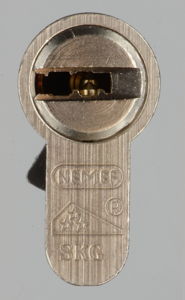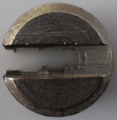Nemef NF4
Nemef NF4
| Nemef NF4 | |
 | |
| Name | Nemef NF4 |
|---|---|
| Manufacturer | Nemef |
| Lock Type | Cylinder |
| Lock Design | Pin-tumbler, Dimple |
| Security Rating(s) | SKG*** |
| Specifications | |
| # of Components | 6 |
| Component Type | Pin-tumbler |
The NF4 is an SKG***-rated pin-tumbler cylinder with a dimple key, made by Nemef. In addition to the six usual dimple pins, it contains two active checkpins.
Principles of operation
The lock contains six pin stacks. Its most distinctive feature is the use of multiple diameter keypins, which together with a special warding causes the key pin tips at rest aren't at the same level (sometimes referred to as "shadow drilling"). These features provide additional resistance to key bumping attacks. The pin stacks alternate between serrated and spooled drivers, but due to the way the key pins rest in the chambers, the spools effectively engage only when paired with three shortest key pins. All of the drivers have slightly tapered tips, which act as an anti-picking protection.
The core has four top chambers for checkpins, but in the bible there are only two chambers that can hold the checkpin drivers (are there locks with bible chambers in different positions?). The checkpin drivers have a spring attached and their height hints that there are only two possible checkpin heights. The checkpin driver in the chamber that contains a checkpin that needs lifting is fully inside the core, exposing the part where the spring is attached to the shearline. This causes the checkpin binds pretty hard and requires noticeable counter-rotation before it can be set.
Disassembly instructions
To diassemble this lock, shim is required to avoid checkpin drivers blocking core removal by catching on the circlip groove. To disassemble a double euro cylinder, segmented follower is required to disassemble single side. Start by removing both circlips, rotate both cores by 45 degrees (with no rotation a checkpin driver might enter an empty chamber) and carefully remove the cam. Then apply the shim (easier said than done), position the lock either vertically, or rotate it in such a way the pins are horizontal and start inserting the follower segments. When the core is out, you can remove the shim and start removing the drivers, just be careful to avoid the top drivers shooting out uncontrollably. Also be careful when handling the top drivers, they are quite temperamental.
When assembling the lock, don't insert all the springs into the bible first (although their length allows that), because to insert the top drivers into their chambers, it is best to turn the lock so that the chamber is in the bottom. Carefully insert the driver into its chamber and use something like a dimple flag to force it fully into its chamber, finishing the process by the follower advance. When all the chambers are loaded, before inserting the core, insert the shim over the top drivers. Then the core can be inserted back, taking care no driver can enter the free top chambers. Finally take care to insert the cam clutch oriented correctly (see the notch to the side of the center rivet of the cam clutch), otherwise it would be impossible to fully insert the key into the lock.
Vulnerabilities
The Nemef NF4 is vulnerable to one or more of the following:
- Lockpicking
- Decoding
- Key bumping (It is resistant to but theoretically possible to bump this lock)
- Impressioning
Gallery
References









